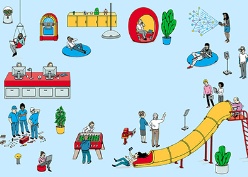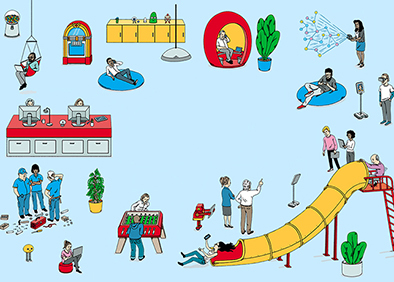You are viewing 1 of your 1 free articles

Steve Douglas is chief executive of St Mungo’s
Brave new world
Housing associations must embrace change or be left behind, says Steve Douglas

Steve Douglas is chief executive of St Mungo’s
The Innovation Index published by Inside Housing begs the question ‘what is innovation?’. And ‘is there really any innovation in the sector?’. Fundamentally, isn’t housing just about managing properties and tenancies, with a bit of new building thrown in? After all, that’s what we’ve been doing for over 150 years in some cases.

Well coincidentally, a group of housing associations in the West Midlands asked that very question and commissioned research to find out.
The report, Innovation: The Brave New World?, commissioned by the National Housing Federation West Midlands Committee and just published, started by exploring what we mean by innovation. Steve Jobs, the Apple founding CEO, suggested: “Innovation distinguishes between a leader and a follower.” The dictionary definition is “the process of generating and implementing new ideas; adapting to changes in the operating environment or market”. My view is that it is about understanding your market and staying relevant. And the reason for innovating is that if you don’t you’ll get left behind by the competition. Whether that’s between organisations within the sector or from competition from outside the sector. Or whether it’s just to be able to deliver the same or better with less.
“We found more associations were thinking about innovation than weren’t.”
What we found was encouraging. Associations of all sizes and shapes were starting to think differently about how they deliver services and how they can increase both efficiency and effectiveness. On the scale of innovation, where true innovators are the likes of Uber, Airbnb and Netflix, and laggards are the likes of Kodak, HMV, Dixons and Thomas Cook, we found more associations were thinking about innovation than weren’t, with a number already doing it in practice.
Always happy to name check organisations that are doing interesting things, Bromford were being quite radical in creating neighbourhood coaches and moving from specialist to generic roles, with a single point of contact, aiming to reduce the number of reduced handovers and introducing smaller housing management patches. Their pilots suggest a potential for improved rent collection, reduced repairs demand, and that Holy Grail, social value returns over the next five years. Orbit were doing some interesting things around digital access, Fortis Living on governance restructuring and co-terminus boards, and Midland Heart and WHG on joint procurement.
What struck me though was that the really transformative thinking is around digitalisation. And as well as developing more online and digital processes, associations are also making increased use of their online presence through social networks such as Facebook to engage more directly with their customers.
However, the extent to which so–called channel shift has been implemented has varied and our research indicates that effective digitalisation requires a genuine organisation-wide commitment to a paradigm shift in thinking, changing culture, dumping or fundamentally re-appraising processes, and thinking about people and culture organisational design and technology in its totality, not just piecemeal.
And competition to provide services is increasing. Those arm’s-length management organisations (ALMOs) that still remain are re-inventing themselves as more than managing agents and are becoming a local authority’s best friend, as managers, community investors, and builders of new homes. Smart move. One ALMO that we know has identified 97% of its residents use the internet, 90% on a daily basis and 80% use a smartphone to access services. Its transformation programme will aim to deliver better services, and lower cost.
The private sector is also eyeing the opportunities to enter a deregulated market, when the social housing regulator’s powers change and the consents regime disappears.
And if housing associations are to stay relevant then they need to innovate to compete. There are encouraging signs. We’re just completing a survey of housing leaders. Of the 85 responses so far, 60% are currently implementing a transformation programme and another 35% are planning one.
Over 70% of organisations are including digitalisation of services and process redesign in their programmes, and nearly 50% have looked at the retail and banking sectors to help inform their own transformation.
My conclusion is therefore that while not every association will be as bold as Richmond Housing Partnership, number one in the Innovation Index, every association should try to nurture a culture that encourages ideas and creative thinking, is prepared to invest in research and development, in trying and piloting new things and is prepared to fail at a few things to learn and do better.
And for those who believe that housing associations will always be there and always be needed, let Steven Sasson and Kodak be your apocryphal story. Steve was a talented employee at Kodak and came up with a new and rather different idea to producing pictures. He called it the digital camera, but his employers said it would never work; people would always want hard copy pictures. We know the end of the story for Kodak.
Innovation is here and around us happening at pace. Perversely, if ‘owning your own future’ is to be truly meaningful, it will be about learning from others, both within and beyond our sector and possibly radically overhauling the way that we do business. Saying it, of course, is the easy part, the doing it is what’s tough, but associations haven’t baulked at what’s tough in the past. It’s clear that a good number are not baulking now.
Steve Douglas, partner, Altair













